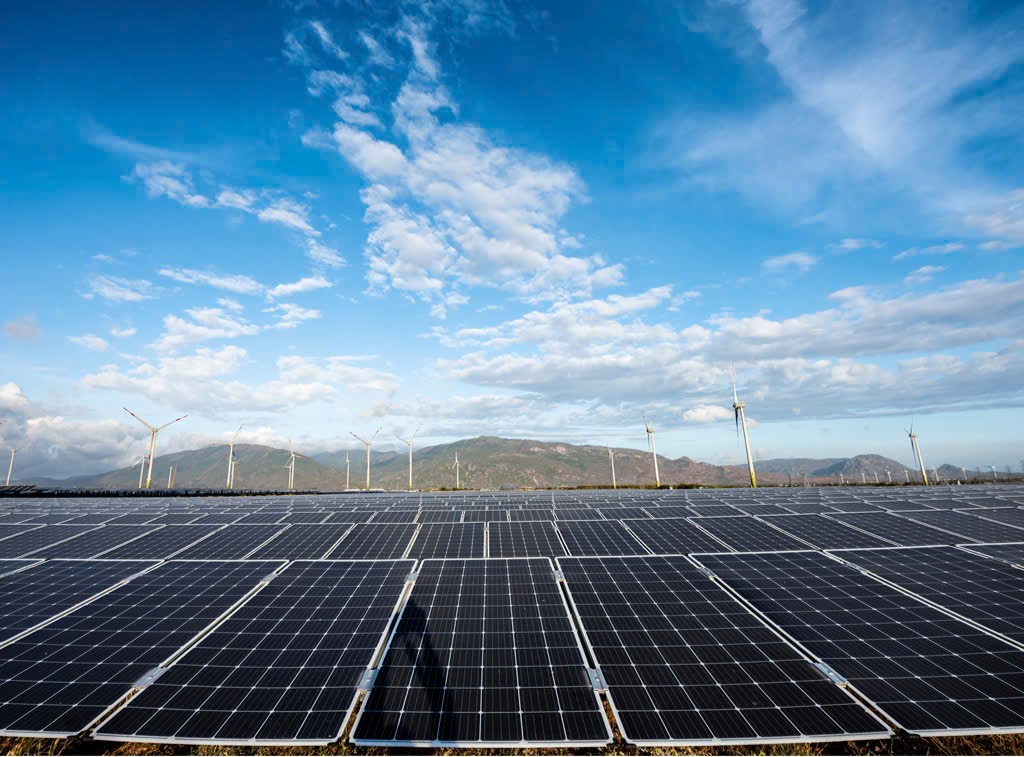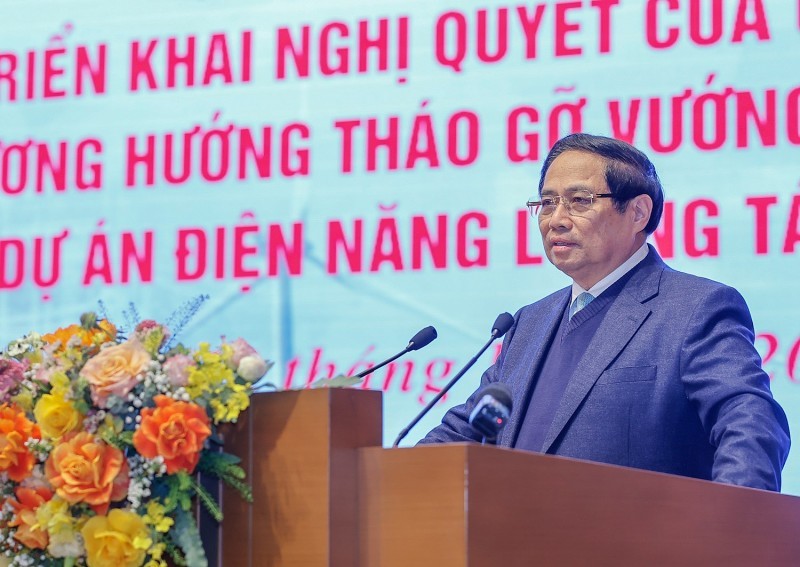Proposing policies for developing the wind and solar and gas power projects in Vietnam
09:42 | 30/09/2022
The proposals for the policies on developing the wind, solar and gas power projects in Vietnam are:
I. The presentations focused on the following main contents:
(i) The domestic gas and imported LNG power projects should be the indispensable transition stage in the process to net zero carbon emissions. The advantages of the gas power projects are reducing CO2 emissions and pollutants, and the ability to quickly change the load capacity to respond to regulation and system operation when the rate of renewable energy is high. The Government needs to consider planning for large LNG thermal power centers, linking the LNG value chain (gas, electricity and seaport) to have reasonable gas prices after regasification and electricity prices. The gas supply contracts must be for a large volume (for the whole thermal power centers) and long-term period, in order to increase volume, reduce costs and stabilize operation and consumption.
(ii) Currently, in the power system there are 15 gas-fired power plants with a total capacity of about 8,000 MW in operation. However, gas output at fields is declining, while the demand for gas is increasing. For many years, no gas power projects have been invested and put into operation. LNG storage and processing technology are very complicated, copyrighted, requires large investment capital, and must be developed by the project chain, so the capital is even larger. The gas price mechanism must be promulgated by harmonizing the interests of the state, businesses and consumers.
(iii) In the current period, Vietnam needs independent power plants (IPPs) using foreign investment capital, from international banks. Therefore, it is necessary to have the legal frameworks, solid regulations and PPAs for convincing the banks and lend capital institutions. The investors of gas-fired power projects proposed the guarantee of the exchange rate and the government guarantee for the responsibility of the power traders with an offtake of electricity output (up to 90% of electricity output).
(iv) Despite there were the strong development steps, the wind, solar and gas power projects faced great difficulties and challenges as the management of the planning was not effective and not synchronized, the site clearance and compensation were always the large challenges for the projects. The strong development of wind and solar power projects led to unbalance between supply and demand. The financial risks depend on the price mechanism and operational management capacity.
(v) The development investment process of offshore wind power farms can last from 7 to 11 years (including the project preparation, construction, and testing). Therefore, it is necessary to have an appropriate legal framework (including strategic vision, handover of marine space, grid connection, incentive tax and encouraging supply chain development).
(vi) In three years (2019 – 2021) the installed capacity of the power system increased strongly (18%/year), mainly by the wind and solar power projects. The high rate of renewable energy (RE) created challenges for the stability of the power grid with the low system inertia, transmission line congestion, renewable energy redundancy, large false prediction error, risk of Fault Ride Through (FRT) and reduction short circuit currence ratio (SCR) causes instability.
(vii) Regarding rooftop solar power projects, at present, there are no national technical standards for rooftop solar power system equipment, no regulations on supervision and control of the rooftop solar systems, so the dispatching level cannot command operation. There is no unity on guidelines for fire prevention and fighting, land use, construction safety, environmental impact, and business registration. The impacts of the rooftop solar system on the electricity quality (voltage, harmonics, voltage flickers) should be studied and overcome. The mechanisms on the solar and wind power projects expired, but there is no replacement and transitional new pricing mechanism.
II. Outstanding issues interested at the conference:
The presentations and discussions at the conference highlighted a number of challenges related to mechanisms and policies for developing wind, solar and gas power projects in Vietnam, including :
1. Challenges in developing the gas power projects:
The foreign experts considered that to sell electricity at 8 - 9 cents/kWh, the LNG price must be at or below 12 USD/MMBTU and the offtake electricity output Qc must be 80-90%. It is a long-term contract with a large volume for reasonable LNG prices, less affected by geopolitical fluctuations. Gas prices must be converted equally to electricity prices when there is a change in the gas market. Many investors also require government guarantees for the loans, exchange rate, foreign currency conversion and to guarantee payments of the electricity buyers.
2. Challenges in the wind and solar power development:
The FIT rates for the solar power projects (Decision 13/2020/QD-TTg) and wind power projects (Decision 39/2018/QD-TTg) are expired. It is necessary to make the new electricity price framework for renewable energy as soon as possible.
The technical obstacles in operating the power system with high RE projects lead to unstable factors that require to increase the of flexible standby projects such as gas power plants and power storage elements.
III. A number of proposals and recommendations for developing the solar, wind and gas power projects:
Based on the discussions and proposals at the conference, the Scientific Council of the Vietnam Energy Magazine proposes a number of the following commendations:
1. For gas power projects:
a. In order to develop gas power projects, it is necessary to do planning for the large LNG thermal power centers, linking LNG value chains (gas, electricity, seaports) to have gas prices after regasification, and electricity prices at a reasonable level. The Ministry of Industry and Trade and the Prime Minister need to promulgate the LNG tariff framework, the offtake rate and an agreement to convert gas prices equally to electricity prices or have clear instructions on this issue.
b. The Government should have a definitive policy on the Government guarantees for loans, exchange rates, foreign currency conversion, and for payments of electricity buyers ịn the gas development and ensure justice for all types of enterprises.
c. Investors can still get good imported LNG prices, competitive with other fossil fuels when investors sign long-term contracts for LNG. Therefore, the Government needs to create conditions for the above policy so that investors have the basis to sign long-term contracts to import LNG and borrow capital for construction investment.
2. For wind and solar power projects:
a. It is necessary to have an electricity buying framework for the solar and wind power projects to replace the FIT as soon as possible, many enterprises completed RE projects without selling electricity in the case that the power system faces a risk of power shortage in the near future but the new enterprises do not dare to invest. The price policy must be long-term and adjusted to the market so that the investors can calculate the risks in advance.
In the immediate future, it is proposed to urgently issue a pilot mechanism for the Direct Power Purchase Agreement (DPPA) and a mechanism to select project developers on the basis of promulgating the framework for buying the electricity for the solar and wind power projects as the basis for EVN and investors to negotiate PPAs.
b. Continuing to allow developing the rooftop solar power projects with the self-use purpose, not generating electricity (not selling electricity) to the national grid. However, the Government and the Ministry of Industry and Trade need to issue technical regulations for the self-use rooftop solar power projects so that these projects do not affect the power grid.
c. offshore wind power projects require a very long time for development time. Therefore, in order to get 7 GW of offshore wind power projects by 2030 as shown in the draft Power Development Planning VIII, it is necessary to make a national marine spatial planning, with clear legal regulations on surveying and handing over the sea surface to the investors and centralized planning on the transmission grid for offshore wind power.
3. Regarding other contents related to wind, solar and gas power projects:
a. The site clearance is always difficult for the gas, wind and solar power projects. It is necessary to improve the policies, on land including a clear, transparent and acceptable process for both investors and land users and which may distinguish the compensation for permanent land after drowning, compensation with support for land use restrictions and temporary compensation during construction.
b. It is necessary to balance developing the different power source projects. Currently, the high rate of RE creates challenges for the stability of the power grid. The regulations on auxiliary grid services are needed to encourage investment in services such as pumped storage hydropower projects, storage batteries, upgrading the power grid and encouraging the transport sector to use electric vehicles and battery charging stations for increasing the RE rate and efficiency of RE projects.
c. It is necessary to develop a mechanism, or put in place binding conditions for project developers on the requirements to encourage the localization of products and services, and to encourage cooperation between the domestic suppliers and the foreign project developers.










